#lm 4.12.2
Explore tagged Tumblr posts
Text
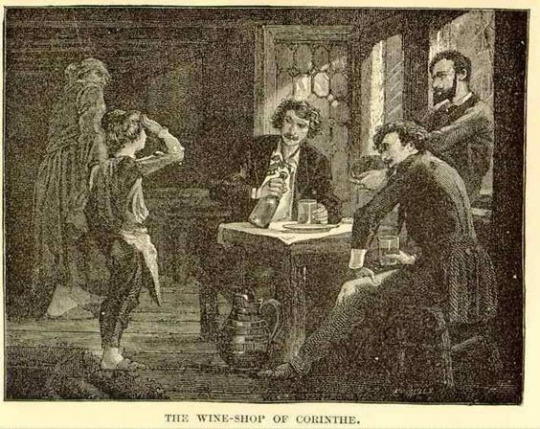
Forgot to post it on time
Preliminary Gayeties
by Gustave Brion
#les mis letters#lm 4.12.2#grantaire#bossuet#joly#les mis illustrations#gustave brion#les mis#les miserables
51 notes
·
View notes
Text
Preliminary Gayeties, Part 1
LAIGLE DE MEAUX, as the reader knows, lived more with Joly than elsewhere. He had a lodging, as a bird has one on a branch. The two friends lived together, ate together, slept together. They had everything in common, even Musichetta, to some extent. They were, what the subordinate monks who accompany monks are called, bini. On the morning of the 5th of June, they went to Corinthe to breakfast. Joly, who was all stuffed up, had a catarrh which Laigle was beginning to share. Laigle's coat was threadbare, but Joly was well dressed.

It was about nine o'clock in the morning, when they opened the door of Corinthe.
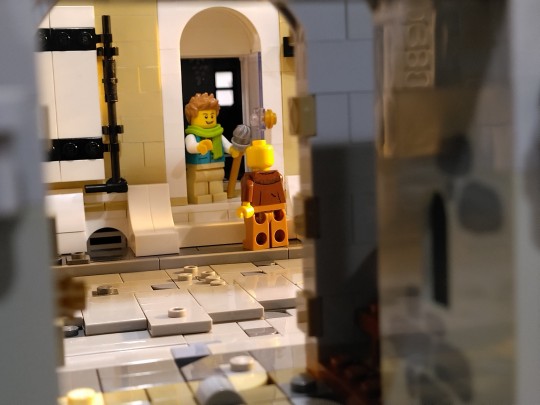
They ascended to the first floor. Matelote and Gibelotte received them.
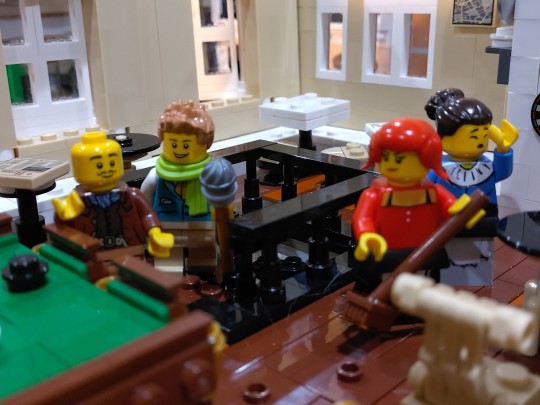
"Oysters, cheese, and ham," said Laigle. And they seated themselves at a table.
The wine-shop was empty; there was no one there but themselves.
Gibelotte, knowing Joly and Laigle, set a bottle of wine on the table.
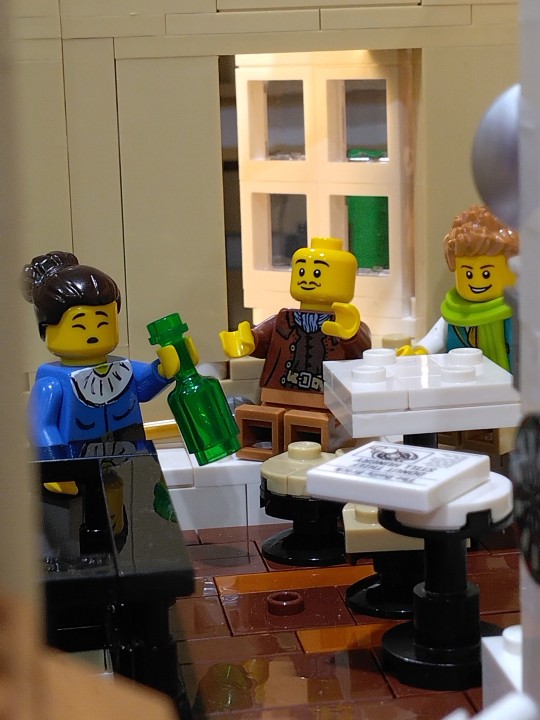
While they were busy with their first oysters, a head appeared at the hatchway of the staircase, and a voice said:
"I am passing by. I smell from the street a delicious odor of Brie cheese. I enter." It was Grantaire.
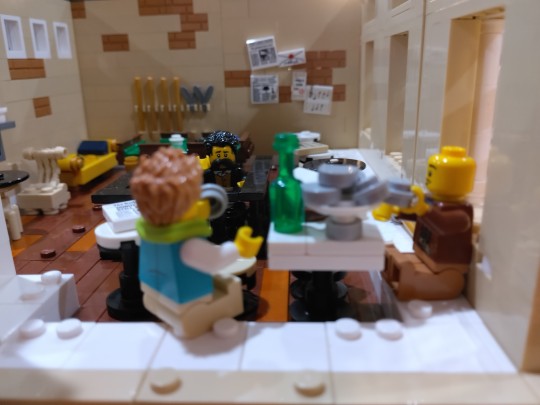
Grantaire took a stool and drew up to the table.
At the sight of Grantaire, Gibelotte placed two bottes of wine on the table. That made three.
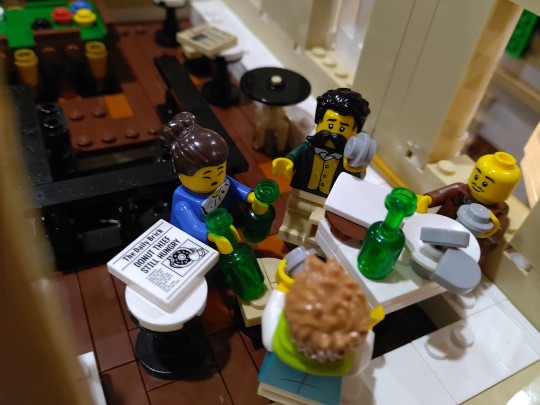
"Are you going to drink those two bottles?" Laigle inquired of Grantaire.
Grantaire replied, "All are ingenious, thou alone art ingenuous. Two bottles never yet astonished a man."
The others had begun by eating, Grantaire began by drinking. Half a bottle was rapidly gulped down.
"So you have a hole in your stomach?" began Laigle again.
“You have one in your elbow," said Grantaire. And after having emptied his glass, he added: "Ah, by the way, Laigle of the funeral oration, your coat is old.”
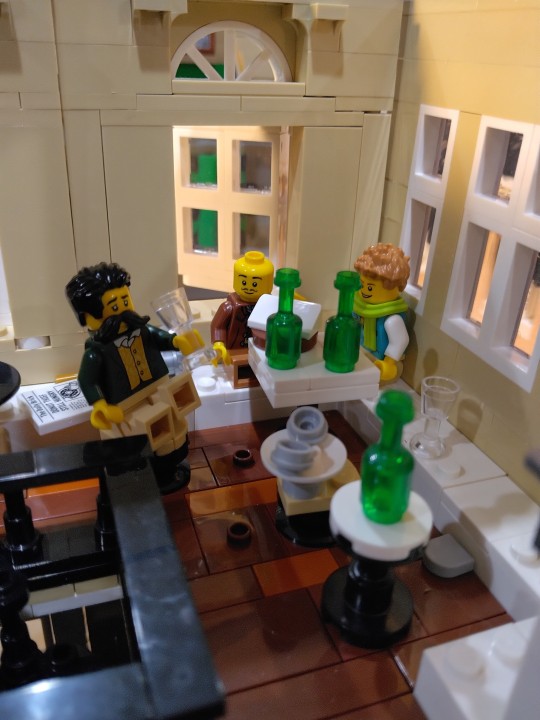
“I should hope so," retorted Laigle. "That's why we get on well together, my coat and I. It has acquired all my folds, it does not bind me anywhere, it is moulded on my deformities, it falls in with all my movements, I am only conscious of it because it keeps me warm. Old coats are just like old friends."
"That's true," ejaculated Joly, striking into the dialogue, "an old goat is an old abi” (ami, friend).
"Especially in the mouth of a man whose head is stuffed up," said Grantaire.
"Grantaire," demanded Laigle, "have you just come from the boulevard?"
"No."
"We have just seen the head of the procession pass, Joly and I."
"It's a marvellous sight," said Joly.
"How quiet this street is!" exclaimed Laigle. "Who would suspect that Paris was turned upside down? How plainly it is to be seen that in former days there were nothing but convents here! In this neighborhood! Du Breul and Sauval give a list of them, and so does the Abbé Lebeuf. They were all round here, they fairly swarmed, booted and barefooted, shaven, bearded, gray, black, white, Franciscans, Minims, Capuchins, Carmelites, Little Augustines, Great Augustines, old Augustines, there was no end of them."
"Don't let's talk of monks," interrupted Grantaire, "it makes one want to scratch oneself."
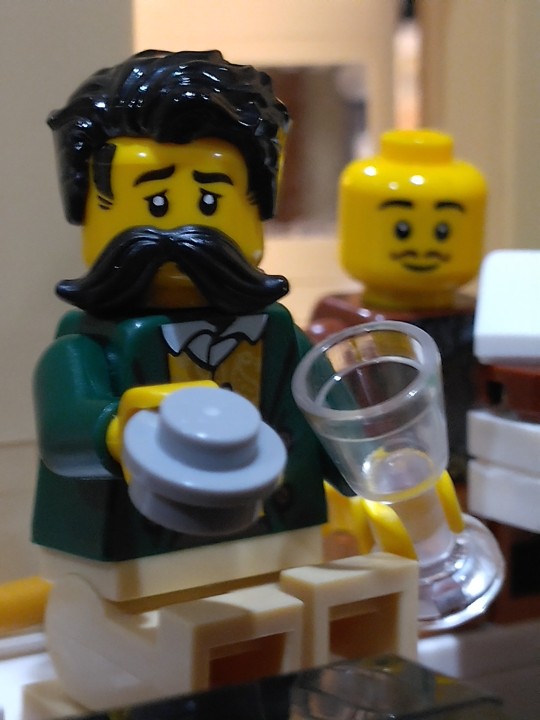
“Bouh! I've just swallowed a bad oyster. Now hypochondria is taking possession of me again. The oysters are spoiled, the servants are ugly. I hate the human race. I just passed through the Rue Richelieu, in front of the big public library. That pile of oyster-shells which is called a library is disgusting even to think of. What paper! What ink! What scrawling!
"And then, I met a pretty girl of my acquaintance, who is as beautiful as the spring, worthy to be called Floréal, and who is delighted, enraptured, as happy as the angels, because a wretch yesterday, a frightful banker all spotted with small-pox, deigned to take a fancy to her! Alas! woman keeps on the watch for a protector as much as for a lover; cats chase mice as well as birds. Two months ago that young woman was virtuous in an attic, she adjusted little brass rings in the eyelet-holes of corsets, what do you call it? She sewed, she had a camp bed, she dwelt beside a pot of flowers, she was contented. Now here she is a bankeress. This transformation took place last night. I met the victim this morning in high spirits. The hideous point about it is, that the jade is as pretty to-day as she was yesterday. Her financier did not show in her face. Roses have this advantage or disadvantage over women, that the traces left upon them by caterpillars are visible. Ah! there is no morality on earth. I call to witness the myrtle, the symbol of love, the laurel, the symbol of air, the olive, that ninny, the symbol of peace, the apple-tree which came nearest rangling Adam with its pips, and the fig-tree, the grandfather of petticoats. As for right, do you know what right is? The Gauls covet Clusium, Rome protects Clusium, and demands what wrong Clusium has done to them. Brennus answers: ‘The wrong that Alba did to you, the wrong that Fidenæ did to you, the wrong that the Eques, the Volsci, and the Sabines have done to you. They were your neighbors. The Clusians are ours. We understand neighborliness just as you do. You have stolen Alba, we shall take Clusium.’ Rome said: ‘You shall not take Clusium.’ Brennus took Rome. Then he cried: ‘Væ victis!’ That is what right is. Ah! what beasts of prey there are in this world! What eagles! It makes my flesh creep.”
He held out his glass to Joly, who filled it, then he drank and went on, having hardly been interrupted by this glass of wine, of which no one, not even himself, had taken any notice:—
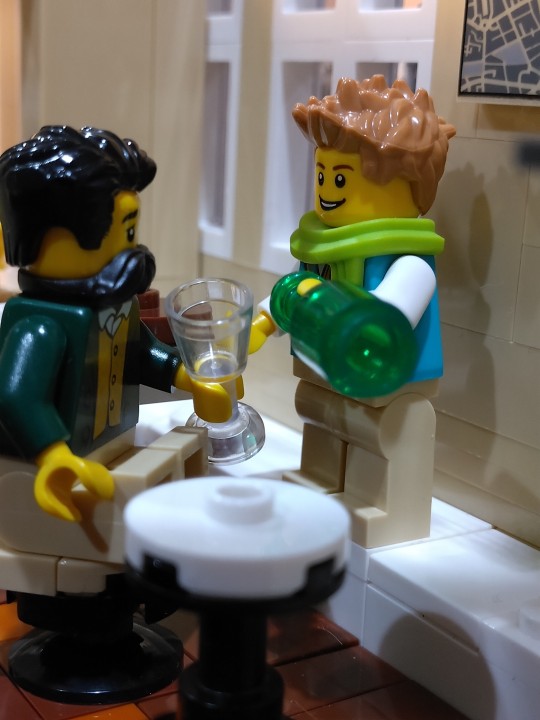
“Brennus, who takes Rome, is an eagle; the banker who takes the grisette is an eagle. There is no more modesty in the one case than in the other. So we believe in nothing. There is but one reality: drink. Whatever your opinion may be in favor of the lean cock, like the Canton of Uri, or in favor of the fat cock, like the Canton of Glaris, it matters little, drink. You talk to me of the boulevard, of that procession, et cætera, et cætera. Come now, is there going to be another revolution? This poverty of means on the part of the good God astounds me. He has to keep greasing the groove of events every moment. There is a hitch, it won’t work. Quick, a revolution! The good God has his hands perpetually black with that cart-grease. If I were in his place, I’d be perfectly simple about it, I would not wind up my mechanism every minute, I’d lead the human race in a straightforward way, I’d weave matters mesh by mesh, without breaking the thread, I would have no provisional arrangements, I would have no extraordinary repertory. What the rest of you call progress advances by means of two motors, men and events. But, sad to say, from time to time, the exceptional becomes necessary. The ordinary troupe suffices neither for event nor for men: among men geniuses are required, among events revolutions. Great accidents are the law; the order of things cannot do without them; and, judging from the apparition of comets, one would be tempted to think that Heaven itself finds actors needed for its performance. At the moment when one expects it the least, God placards a meteor on the wall of the firmament. Some queer star turns up, underlined by an enormous tail. And that causes the death of Cæsar. Brutus deals him a blow with a knife, and God a blow with a comet. Crac, and behold an aurora borealis, behold a revolution, behold a great man; ’93 in big letters, Napoleon on guard, the comet of 1811 at the head of the poster. Ah! what a beautiful blue theatre all studded with unexpected flashes! Boum! Boum! extraordinary show! Raise your eyes, boobies. Everything is in disorder, the star as well as the drama. Good God, it is too much and not enough. These resources, gathered from exception, seem magnificence and poverty. My friends, Providence has come down to expedients. What does a revolution prove? That God is in a quandry. He effects a coup d’état because he, God, has not been able to make both ends meet. In fact, this confirms me in my conjectures as to Jehovah’s fortune; and when I see so much distress in heaven and on earth, from the bird who has not a grain of millet to myself without a hundred thousand livres of income, when I see human destiny, which is very badly worn, and even royal destiny, which is threadbare, witness the Prince de Condé hung, when I see winter, which is nothing but a rent in the zenith through which the wind blows, when I see so many rags even in the perfectly new purple of the morning on the crests of hills, when I see the drops of dew, those mock pearls, when I see the frost, that paste, when I see humanity ripped apart and events patched up, and so many spots on the sun and so many holes in the moon, when I see so much misery everywhere, I suspect that God is not rich. The appearance exists, it is true, but I feel that he is hard up. He gives a revolution as a tradesman whose money-box is empty gives a ball. God must not be judged from appearances. Beneath the gilding of heaven I perceive a poverty-stricken universe. Creation is bankrupt. That is why I am discontented. Here it is the 4th of June, it is almost night; ever since this morning I have been waiting for daylight to come; it has not come, and I bet that it won’t come all day. This is the inexactness of an ill-paid clerk. Yes, everything is badly arranged, nothing fits anything else, this old world is all warped, I take my stand on the opposition, everything goes awry; the universe is a tease. It’s like children, those who want them have none, and those who don’t want them have them. Total: I’m vexed.
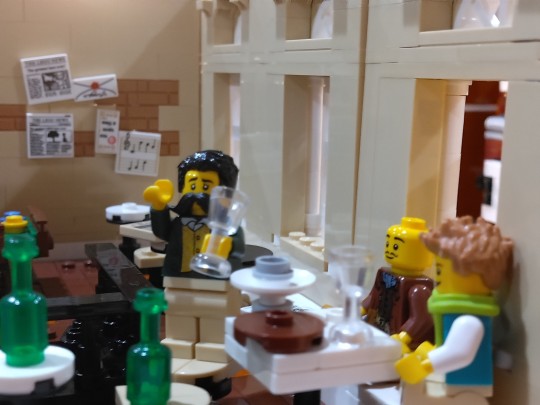
61 notes
·
View notes
Text
i can't believe e/R won the poll on "enjolras disdains me [...] if he had come for me, i would have followed him. so much the worse for enjolras! i won't go to his funeral" day
175 notes
·
View notes
Text
Happy Preliminary Gaieties Day to all the @lesmisletters readers who celebrate!!! May all your stars be unhooked and placed on the table in the guise of candles
50 notes
·
View notes
Text
Some Gaîtés Préalables / Preliminary Gayeties Hapgood translation notes!
I noticed a number of translation discrepancies in this chapter, and I'm sure there are more than these since I didn't go through the translation with a fine tooth comb.
1. “C’est un spectacle berveilleux, dit Joly.” / “It’s a marvellous sight,” said Joly.” This is the first instance that Joly's stuffed up state is shown through his speech (berveilleux instead of merveilleux), and at first I was so disappointed that Hapgood didn't mimic it in the translation but luckily later on in the chapter she does include the speech modification due to stuffy nose. I loved this so much, reminds me of Bilbo in The Hobbit when all he can say is "thag you very buch" due to his cold!
2. “Il fait un coup d’état, parce qu’il y a solution de continuité entre le présent et l’avenir, et parce que, lui Dieu, il n’a pas pu joindre les deux bouts.” “He effects a coup d’état because he, God, has not been able to make both ends meet.” The bolded line in French is skipped in the English translation here and I have no idea why, I really like this line. My attempt at a full translation of this sentence would be: "He stages a coup, because there is a gap between the present and future, and because he, God, hasn't been able to make the two ends meet."
3. “...et à voir tant de malaise en haut et en bas, tant de mesquinerie et de pingrerie et de ladrerie et de détresse au ciel et sur la terre...” “...and when I see so much distress in heaven and on earth...” This part of the very next sentence gets greatly simplified in the Hapgood translation. The French reads something like: "...and to see so much malaise on high and down low, so much pettiness and stinginess and rapacity and distress in heaven and on earth..."
4. “Voyez, c’est le cinq juin...” / “Here it is the 4th of June...” It's June 5th! Not June 4th? ONCE AGAIN Hapgood with the mistranslated numbers???? Can anyone explain this I'm so confused. Why would you change some number by one or two?? It's happened throughout the book with ages, hours, dates...
5. “L’enfant, choisissant sans hésiter parmi les trois, quoiqu’il n’en connût évidemment aucun, s’adressa à Laigle de Meaux.” “The child unhesitatingly making his choice among the three, addressed himself to Laigle de Meaux.” A fairly inconsequential omission here but the English once again skips the bold part of the sentence, reading in full: "The child, choosing among the three without hesitating, though evidently not knowing any of them, addressed himself to Laigle de Meaux."
There may be more but these are only the ones I noticed! What a great chapter, though, as I know we're all aware!
28 notes
·
View notes
Text
Laigle!
"I should hope so," Laigle replied, "for my coat and I live comfortably together. It has assumed all my wrinkles, does not hurt me anywhere, has moulded itself on my deformities, and is complacent to all my movements, and I only feel its presence because it keeps me warm. Old coats and old friends are the same thing."
He’s so funny!
But Grantaire’s behavior is concerning. It’s nice that he immediately joined his friends, but his drinking doesn’t seem healthy. He drinks instead of eating, and it’s not a good sign that two bottles are added to the table as soon as he appears (when one was considered enough for Joly and Bossuet).
I’m not going to cover Grantaire’s ramble in too much depth because I really only caught a few things (“featherless biped”), but:
“among men there must be geniuses, and among events revolutions”
It’s notable that Grantaire seems to believe in the “great man” version of history, which contributes to his idealization of Enjolras and his struggle to contribute. He envisions his friends (and mostly Enjolras) as “great men,” rather than the regular people they actually are, and thus sees them as doomed to die tragically or to succeed gloriously (he leans towards the former here because he’s sad). Having a low opinion of himself, he thinks he can’t contribute because he isn’t “great,” when in reality, the strength of Les Amis and similar groups is that they mobilize and connect many ordinary people who want change!
And poor Joly with his cold!
"It's raiding," said Joly; "I have sworn to go through fire but dot through water, and I do dot wish to bake by cold worse."
Such a funny line! Joly’s willing to face cannonfire, but not getting even more sick.
Grantaire complains that Enjolras didn’t fetch him, but it makes sense? Enjolras has no reason to think Grantaire will come, and Joly really is sick (and is also usually with Bossuet, so any message that reaches one will reach the other). And as nice as this line is:
“Grantaire had led Joly and Bossuet to wine, and Bossuet and Joly had brought Grantaire back to joy.”
Grantaire’s behavior in this chapter is really worrying. It’s morning and Joly’s already trying to keep him from drinking more, because while he’s not dangerously drunk yet, he could get there if he continues. And he’s very depressed, too. When he says “his funeral,” it could have two meanings: the funeral Enjolras is attending, or Enjolras’ funeral. He really believes all his friends are going to die. Bossuet and Joly are aware of that possibility, too - it’s why Joly references “go[ing] through fire” and why they speak seriously about the funeral - but they have hope, too, seeing it as a continuation of 1830. To them, there's a chance of a disaster, but also a chance to claim their rights and improve the state of France.
#les mis letters#lm 4.12.2#bossuet#I love bossuet so much#joly#and him too#grantaire#they're so funny
23 notes
·
View notes
Text
Brickclub 4.12.2 “Preliminary Gaieties“ part 2
Grantaire begins!
The first thing I’m getting from him--beyond the disenchantment with humanity and the sensation of perpetual body horror he seems to carry--is a horror of the way narratives are determined by victors who won by force.
He begins with a negative opinion of libraries, with all their books like discarded oyster shells. Surely not an opinion Hugo shares, but I hear from Grantaire a distrust of both egotism and narrative, along with the misanthropy.
Then, Floréal and her banker. She was a pretty grisette, living the life Fantine lost hold of--she had her flower pot, and she had what sounds like a more specialized form of sewing labor. Now she’s overjoyed that she gets to marry a banker, and Grantaire is disgusted by it.
It could be misogyny here. Just straight up incel vibes, “a pretty girl picked Him instead of Me, even though He was no great shakes either,” etc. etc.
But I think it’s not. Grantaire’s horror seems to me to be about the iniquity of someone having to be happy that they married an entirely unpreposessing banker, because it saved her from a life of poverty. Like Fantine and Cosette, Floréal has an aura of revolution--it’s there in her name (or possibly her nom de guerre, or possibly just what Grantaire has nicknamed her for this anecdote).
And her revolutionary aspects, and her freedom, were worth giving up (gladly! gratefully!) because the iniquities of the world made marrying some stupid banker something almost beyond the wildest dreams of a woman like her.
My sympathetic read of Grantaire here (who is always a little closer to the feminine end of gender stereotypes than he feels like he should be) is that he’s empathizing with the experience of the Floréals of the world: they deserved to have better wildest dreams. Fantine deserved better than being dumped by Tholomyès, yes--but she also deserved better than marrying Tholomyès.
But the narratives belong to the bankers, and so: Floréal got the happy ending Fantine didn’t. She “married above her station,” as they say. Hurrah.
Grantaire goes on to compare the banker with nations who conquer their neighbors simply because they have the power to, describing both as “eagles.” They conquer because they can, he feels, and it’s wrong. But the world is supposed to be happy about it anyway--because the narrative belongs to the victors.
I think we’re learning that Grantaire fucking hates Napoleon (even if he’s veiled about going around saying so), and that’s extremely valid of him. Which--people who know more about Gros should weigh in, but Grantaire did study art under the guy who painted This:
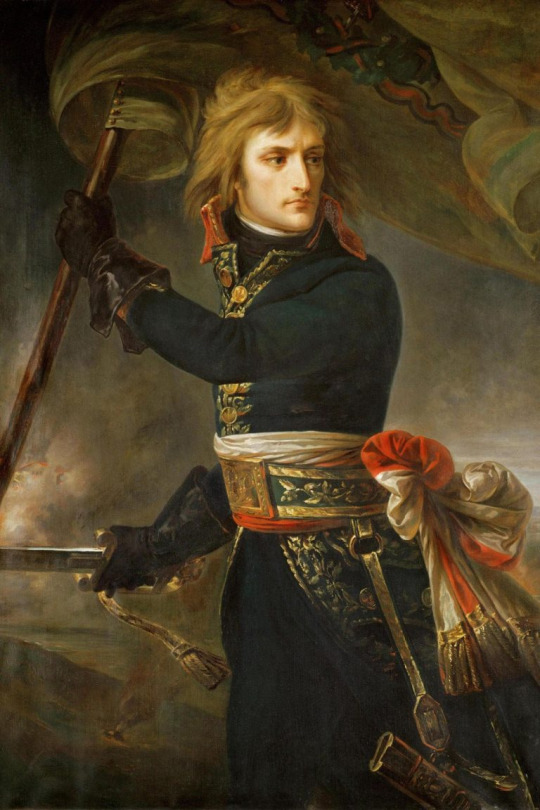
and I have a lot of questions about how that went.
What on earth does it signify that Laigle is also an eagle? He’s a Very different kind of eagle, given that he’s 1) extremely not a bonapartist 2) extremely not someone who goes through the world the way that banker does.
Eagle isn’t one of our uniformly negative animals--it can be used as a compliment, alongside lion; I think Enjolras gets eagled at some point. It may have some war-commander connotations, and Grantaire, unlike his friends, hates war even when it’s genuinely liberatory.
Still don’t know what Laigle has to do with all that, though.
From these very, very valid sympathies, Grantaire pivots to nihilism and hedonism and avoidance. His only solution to any of these problems is: “drink.”
He’s wildly upset because his friends are all maybe about to die, and he’s describing Revolution as the repetitive stage gimmick of an impoverished and uncreative God--though we’ll learn later, when Hugo describes the spring in the Luxembourg gardens (refuting Grantaire’s imagery very, very directly), that there’s nothing impoverished about God. And Joly’s idea (stated later) of the providential office of cats in rectifying the problems of the world (as revolutions do) will be much closer to this book’s ideas of Providence than Grantaire’s rambling about stage sets and cart grease.
Grantaire connects the idea of Great Events, like revolutions, with the idea of Great Men, and he’s fed up with both. And being anti-Great Man is one of our central themes! The book very much agrees with Grantaire that the Great Man is a bad model of how to run things.
But his problem with Great Men and Great Events is the wrong problem: he doesn’t like how disruptive they are, and he doesn’t like the idea that God relies on them like some kind of bad narrative hack.
But the Great Man is a misleading narrartive--maybe because, like the narratives Grantaire disliked above, they're the narrative the victors write.
Because: men of genius DON’T leap out of nowhere and change the world; the world was changed by a million hands over time, and the man designated Great sat up at the right moment, did some things, and then got credit for all of it. Revolutions AREN’T a day or two of violence that erupts out of nowhere as a cheap trick God uses to change things up--they’re the culmination of time, and the changing tides of history, and the long, sustained effort of unimaginable numbers of people.
We were talking in the discord about how Grantaire can’t imagine being a revolutionary without being an all-or-nothing, full-bore, 24/7 revolutionary. If he’s not Enjolras, he thinks, what use is doing anything? And that’s the problem here: he claims to prefer small works and small people and incrementalism, but he can’t see that the people around him, like Joly’s cats, are actually doing that. He hates Great Men, but he thinks the only alternative to them is an utter stagnation where nothing happens at all.
He doesn’t understand that the problem with Great Men (and Great Events) isn’t that they’re a stupid way for God to be running history--the problem with lone Great Men and lone Great Events is that they don’t exist.
#brickclub#lm 4.12.2#i'm not done with the chapter i only got through a couple pages today#i have no idea how many parts this will be#i just thought the post was long enough
86 notes
·
View notes
Text
So replying to this very good post, I realized two things:
-Grantaire wants Revolutionaries Without Revolution.
-... this is a big Romanticism thing. This is a HUGE Romanticism Thing--looking around for roads to the glory and awesomeness that the Empire had once promised after its collapse, and trying to find it in art. The struggle to find a way to be Really Important in a new setting where there IS no permanent conquest, Except By Convincing.
..I’m not saying Grantaire wants Great Men to be like Hugo but. But of course he does. DANG IT VUGS *puts head on table, taps out for 48 hours solid*
#I can tell this is gonna be haunting me#Grantaire has other Hugo-links coming up VERY soon#but AAAAAUGH already#(also : would Grantaire have been happier if he'd latched onto a Very Important Writer? Would he he#Would he hell. )#DAMMIT HUGO#LM 4.12.2
58 notes
·
View notes
Text
Brickclub 4.12.2, “Preliminary Gaieties,” part 4? 5?
A brief wrap-up piggybacking off other people’s observations-- I don’t have anything to add to @everyonewasabird‘s last two posts, so I’m going to corral the evidence for an argument @pilferingapples has made about this whole chapter being a mirror of Valjean’s dinner with the bishop--
In both, we have a household (in this chapter, Joly and Bossuet) sitting down to their usual meal when an unexpected guest arrives (here Grantaire). Bossuet, even aside from his nickname, is aligned with the bishop--he’s clearly the leader of their little subgroup, and he’s been associated with radical but understated hospitality since he rescued Marius. A servant puts out wine for the guest, unasked for--it is specifically noted in Valjean’s dinner that Mme. Magloire adds a bottle of wine of her own initiative.
The guest is not wholly aligned with the hosts’ values, but is at a point of crisis and potential change. He comments on his host’s poverty (Bossuet’s tattered coat, another Myriel note). He explains what he knows about the sort of person his host is, without realizing that that’s who he’s talking to. Here, that’s Grantaire’s whole rant about revolutions and revolutionaries, whom he explicitly describes as Great Men--not seeming to notice that he’s sharing breakfast with the two most regular dude members of the Amis. In Valjean’s dinner with the bishop, it’s this bit:
He was the Bishop of Majore at Marseilles. He is the cure who rules over the other cures, you understand. Pardon me, I say that very badly; but it is such a far-off thing to me! You understand what we are! He said mass in the middle of the galleys, on an altar. He had a pointed thing, made of gold, on his head; it glittered in the bright light of midday. We were all ranged in lines on the three sides, with cannons with lighted matches facing us. We could not see very well. He spoke; but he was too far off, and we did not hear. That is what a bishop is like.
A man haloed in gold, saying (presumably) great words too far away to hear; but all he could really take in was the mouths of the cannons.
The dinner is interrupted by a child in need of alms--here it’s Navet, on his own; in the dinner with the bishop it’s a poor woman begging with her child.
And the bishop-figure makes no overt attempt to win the guest over, but he does call for two candlesticks for the table. Here they’re mismatched, one a completely green copper holder and one a cracked carafe with a candle in its neck, brought by Gibelotte because the rainy day is dark even at noon. They’re not intrinsically valuable, but they don’t need to be to get Grantaire’s attention: “Who has fetched down the stars without my permission and put them on the table as candlesticks?”
10 notes
·
View notes
Text
Preliminary Gayeties, Part 5
Bossuet, though very drunk, preserved his equanimity.
He was seated on the sill of the open window, wetting his back in the falling rain, and gazing at his two friends.

All at once, he heard a tumult behind him, hurried footsteps, cries of “To arms!” He turned round and saw in the Rue Saint-Denis, at the end of the Rue de la Chanvrerie, Enjolras passing, gun in hand, and Gavroche with his pistol, Feuilly with his sword, Courfeyrac with his sword, and Jean Prouvaire with his blunderbuss, Combeferre with his gun, Bahorel with his gun, and the whole armed and stormy rabble which was following them.
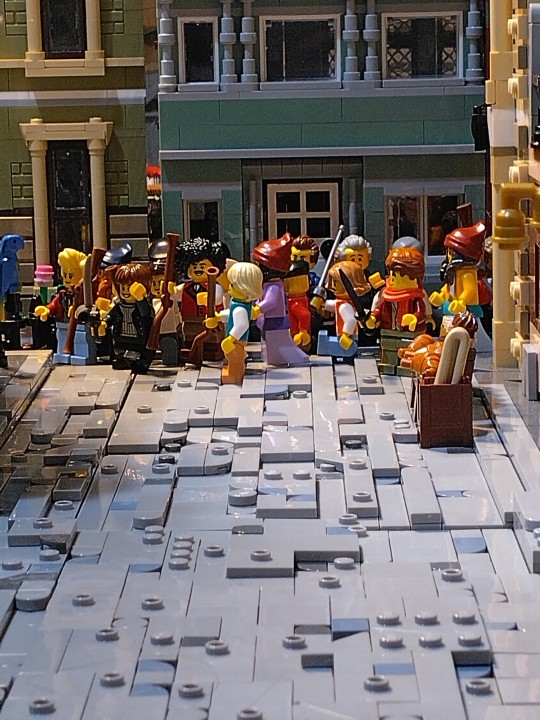

The Rue de la Chanvrerie was not more than a gunshot long. Bossuet improvised a speaking-trumpet from his two hands placed around his mouth, and shouted:—
“Courfeyrac! Courfeyrac! Hohée!”

Courfeyrac heard the shout, caught sight of Bossuet, and advanced a few paces into the Rue de la Chanvrerie, shouting: “What do you want?” which crossed a “Where are you going?”

“To make a barricade,” replied Courfeyrac.
“Well, here! This is a good place! Make it here!”

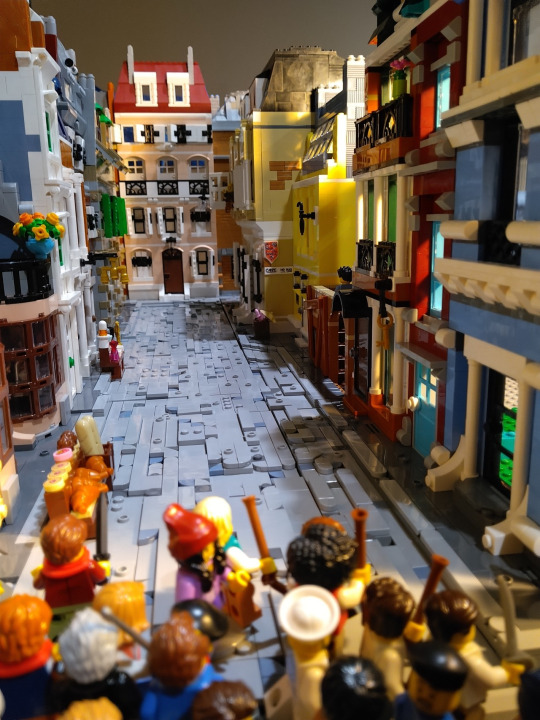
“That’s true, Aigle,” said Courfeyrac.
And at a signal from Courfeyrac, the mob flung themselves into the Rue de la Chanvrerie.
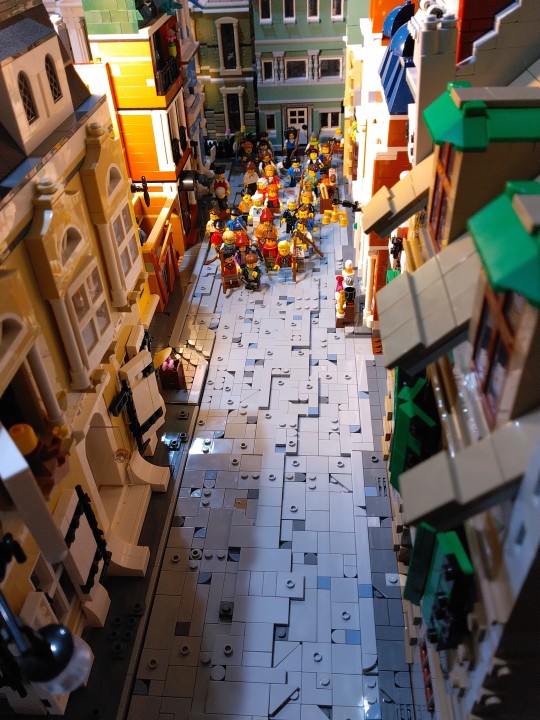
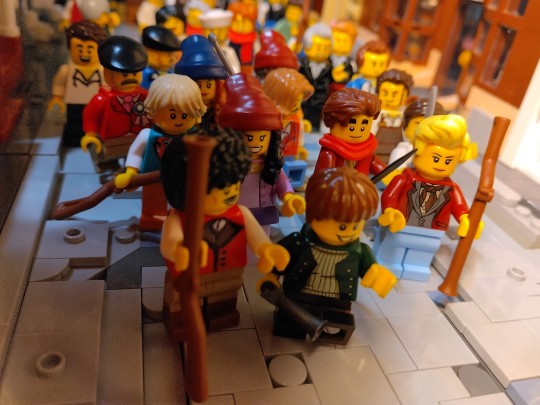
55 notes
·
View notes
Text
Preliminary Gayeties, Part 3

The child gone, Grantaire took the word:—
“That is the pure-bred gamin. There are a great many varieties of the gamin species. The notary’s gamin is called Skip-the-Gutter, the cook’s gamin is called a scullion, the baker’s gamin is called a mitron, the lackey’s gamin is called a groom, the marine gamin is called the cabin-boy, the soldier’s gamin is called the drummer-boy, the painter’s gamin is called paint-grinder, the tradesman’s gamin is called an errand-boy, the courtesan gamin is called the minion, the kingly gamin is called the dauphin, the god gamin is called the bambino.”

In the meantime, Laigle was engaged in reflection; he said half aloud:—
“A B C, that is to say: the burial of Lamarque.”

“The tall blonde,” remarked Grantaire, “is Enjolras, who is sending you a warning.”
“Shall we go?” ejaculated Bossuet.
“It’s raiding,” said Joly. “I have sworn to go through fire, but not through water. I don’t wand to ged a gold.”

“I shall stay here,” said Grantaire. “I prefer a breakfast to a hearse.”
“Conclusion: we remain,” said Laigle. “Well, then, let us drink. Besides, we might miss the funeral without missing the riot.”
“Ah! the riot, I am with you!” cried Joly.

Laigle rubbed his hands.
“Now we’re going to touch up the revolution of 1830. As a matter of fact, it does hurt the people along the seams.”
“I don’t think much of your revolution,” said Grantaire. “I don’t execrate this Government. It is the crown tempered by the cotton night-cap. It is a sceptre ending in an umbrella. In fact, I think that to-day, with the present weather, Louis Philippe might utilize his royalty in two directions, he might extend the tip of the sceptre end against the people, and open the umbrella end against heaven.”

The room was dark, large clouds had just finished the extinction of daylight. There was no one in the wine-shop, or in the street, every one having gone off “to watch events.”
“Is it midday or midnight?” cried Bossuet. “You can’t see your hand before your face. Gibelotte, fetch a light.”

Grantaire was drinking in a melancholy way.
“Enjolras disdains me,” he muttered. “Enjolras said: ‘Joly is ill, Grantaire is drunk.’ It was to Bossuet that he sent Navet. If he had come for me, I would have followed him. So much the worse for Enjolras! I won’t go to his funeral.”

37 notes
·
View notes
Text
Preliminary Gayeties, Part 2

"Besides, Laigle de Meaux, that bald-head, offends my sight. It humiliates me to think that I am of the same age as that baldy. However, I criticise, but I do not insult. The universe is what it is. I speak here without evil intent and to ease my conscience. Receive, Eternal Father, the assurance of my distinguished consideration. Ah! by all the saints of Olympus and by all the gods of paradise, I was not intended to be a Parisian, that is to say, to rebound forever, like a shuttlecock between two battledores, from the group of the loungers to the group of the roysterers. I was made to be a Turk, watching oriental houris all day long, executing those exquisite Egyptian dances, as sensuous as the dream of a chaste man, or a Beauceron peasant, or a Venetian gentleman surrounded by gentlewoman, or a petty German prince, furnishing the half of a foot-soldier to the Germanic confederation, and occupying his leisure with drying his breeches on his hedge, that is to say, his frontier. Those are the positions for which I was born! Yes, I have said a Turk, and I will not retract. I do not understand how people can habitually take Turks in bad part; Mohammed had his good points; respect for the inventor of seraglios with houris and paradises with odalisques! Let us not insult Mohammedanism, the only religion which is ornamented with a hen-roost! Now, I insist on a drink. The earth is a great piece of stupidity. And it appears that they are going to fight, all those imbeciles, and to break each other’s profiles and to massacre each other in the heart of summer, in the month of June, when they might go off with a creature on their arm, to breathe the immense heaps of new-mown hay in the meadows! Really, people do commit altogether too many follies. An old broken lantern which I have just seen at a bric-à-brac merchant’s suggests a reflection to my mind; it is time to enlighten the human race. Yes, behold me sad again. That’s what comes of swallowing an oyster and a revolution the wrong way! I am growing melancholy once more. Oh! frightful old world. People strive, turn each other out, prostitute themselves, kill each other, and get used to it!”
And Grantaire, after this fit of eloquence, had a fit of coughing, which was well earned.

“À propos of revolution,” said Joly, “it is decidedly abberent that Barius is in lub.”
“Does any one know with whom?” demanded Laigle.
“Do.”
“No?”
“Do! I tell you.”

“Marius’ love affairs!” exclaimed Grantaire. “I can imagine it. Marius is a fog, and he must have found a vapor. Marius is of the race of poets. He who says poet, says fool, madman, Tymbræus Apollo. Marius and his Marie, or his Marion, or his Maria, or his Mariette. They must make a queer pair of lovers. I know just what it is like. Ecstasies in which they forget to kiss. Pure on earth, but joined in heaven. They are souls possessed of senses. They lie among the stars.”

Grantaire was attacking his second bottle and, possibly, his second harangue, when a new personage emerged from the square aperture of the stairs. It was a boy less than ten years of age, ragged, very small, yellow, with an odd phiz, a vivacious eye, an enormous amount of hair drenched with rain, and wearing a contented air.

The child unhesitatingly making his choice among the three, addressed himself to Laigle de Meaux.
“Are you Monsieur Bossuet?”
“That is my nickname,” replied Laigle. “What do you want with me?”

“This. A tall blonde fellow on the boulevard said to me: ‘Do you know Mother Hucheloup?’ I said: ‘Yes, Rue Chanvrerie, the old man’s widow;’ he said to me: ‘Go there. There you will find M. Bossuet. Tell him from me: “A B C”.’ It’s a joke that they’re playing on you, isn’t it. He gave me ten sous.”
“Joly, lend me ten sous,” said Laigle; and, turning to Grantaire: “Grantaire, lend me ten sous.”
This made twenty sous, which Laigle handed to the lad.

“Thank you, sir,” said the urchin.
“What is your name?” inquired Laigle.
“Navet, Gavroche’s friend.”
“Stay with us,” said Laigle.
“Breakfast with us,” said Grantaire.

The child replied:—
“I can’t, I belong in the procession, I’m the one to shout ‘Down with Polignac!’”
And executing a prolonged scrape of his foot behind him, which is the most respectful of all possible salutes, he took his departure.

40 notes
·
View notes
Text
Preliminary Gayeties, Part 4
This resolution once arrived at, Bossuet, Joly, and Grantaire did not stir from the wine-shop. By two o’clock in the afternoon, the table at which they sat was covered with empty bottles. Two candles were burning on it, one in a flat copper candlestick which was perfectly green, the other in the neck of a cracked carafe. Grantaire had seduced Joly and Bossuet to wine; Bossuet and Joly had conducted Grantaire back towards cheerfulness.

As for Grantaire, he had got beyond wine, that merely moderate inspirer of dreams, ever since midday. Wine enjoys only a conventional popularity with serious drinkers. There is, in fact, in the matter of inebriety, white magic and black magic; wine is only white magic. Grantaire was a daring drinker of dreams. The blackness of a terrible fit of drunkenness yawning before him, far from arresting him, attracted him. He had abandoned the bottle and taken to the beerglass. The beer-glass is the abyss. Having neither opium nor hashish on hand, and being desirous of filling his brain with twilight, he had had recourse to that fearful mixture of brandy, stout, absinthe, which produces the most terrible of lethargies. It is of these three vapors, beer, brandy, and absinthe, that the lead of the soul is composed. They are three grooms; the celestial butterfly is drowned in them; and there are formed there in a membranous smoke, vaguely condensed into the wing of the bat, three mute furies, Nightmare, Night, and Death, which hover about the slumbering Psyche.
Grantaire had not yet reached that lamentable phase; far from it. He was tremendously gay, and Bossuet and Joly retorted. They clinked glasses. Grantaire added to the eccentric accentuation of words and ideas, a peculiarity of gesture; he rested his left fist on his knee with dignity, his arm forming a right angle, and, with cravat untied, seated astride a stool, his full glass in his right hand, he hurled solemn words at the big maid-servant Matelote:—
“Let the doors of the palace be thrown open! Let every one be a member of the French Academy and have the right to embrace Madame Hucheloup. Let us drink.”

And turning to Madame Hucheloup, he added:—
“Woman ancient and consecrated by use, draw near that I may contemplate thee!”
And Joly exclaimed:—
“Matelote and Gibelotte, dod’t gib Grantaire anything more to drink. He has already devoured, since this bording, in wild prodigality, two francs and ninety-five centibes.”

And Grantaire began again:—
“Who has been unhooking the stars without my permission, and putting them on the table in the guise of candles?”

28 notes
·
View notes
Text
Oh, what a lovely chapter! Hugo mercifully takes us back in time once again and starts the 5 June once again. We have already experienced it through Marius, then Gavroche, and now through Bossuet, Joly, and Grantaire! And we also get a chance to learn more about bini! These two “lived together, ate together, slept together. They had everything in common, even Musichetta, to some extent.” They are adorable! Why do we learn about this so late?
And these three are uninterested in attending the funeral, much like Marius. Speaking about Marius… they gossip about him! Grantaire’s assessment of Marius’ love affair is spot on – it’s almost supernatural! “Marius is a fog, and he must have found a vapor… Ecstasies in which they forget to kiss. Pure on earth, but joined in heaven. They are souls possessed of senses. They lie among the stars.” This perfectly captures what is happening between Marius and Cosette.
Oh, god! Grantaire's descent into intoxication to the point of near-death is genuinely distressing. Though, now I will know that wine is white magic [pouring myself a glass of white magic]. So, wine did not suffice for him, and he wouldn’t have minded some stronger substance like opium or hashish, but he didn’t have them on hand! I don’t recall this from my previous reading. And he had to settle for a mixture of brandy, stout, and absinthe. Wow, that’s some black magic indeed.
And we also meet Gavroche’s fellow gamin and friend, Navet. Following Enjolras’ instructions, Navet calls Bossuet to join the company at the funeral. Poor Joly has the flue and is not ready to go out into the rain. Grantaire feels slighted that Enjolras did not send for him: “If he had come for me, I would have followed him. So much the worse for Enjolras! I won’t go to his funeral.” So they all stay and continue to drink.
Then, a barricade comes to them. When Bossuet shouts to Courfeyrac, Hugo ominously remarks that the Rue de la Chanvrerie was “not more than a gunshot long.” That’s it.
#les mis letters#lm 4.12.2#les miserables#grantaire#bossuet#marius pontmercy#cosette#gavroche#enjolras
53 notes
·
View notes
Text
I'm only halfway through today's Les Mis letters chapter and even with only occasionally looking at the Hapgood English I've already noticed a number of of skipped/wrong translations?? Also I'm SO confused as to why numbers are so often translated incorrectly in her version.
I want to make a post about all the ones I notice in this chapter but I might not get it together today, we shall see
16 notes
·
View notes
Text
Brickclub 4.12.2 Preliminary Gaieties part 1
Chapters have been short lately, but this one is longer--and there’s a whole lot in it. Brickclub is planning to take a few days for it.
I always find it interesting that we learn that Joly and Lesgle “share everything” just a couple sentences before we learn that Joly is well-dressed and Laigle’s coat is so beat up they spend a fair amount of time joking about it.
On a practical level, they may be very different sizes, etc, and Joly may be making a special effort to follow Bahorel’s advice these last few years. But, I don’t know, it’s one of the interesting contradictory details that this book is so good at. They share everything, but Lesgle is homeless, and he kinda looks it. Joly’s rooms are Joly’s rooms, and Lesgle is staying there; it’s not described as an apartment that belongs to both of them. I don’t know, it’s an interesting choice.
If nothing else, it implies Lesgle is bigger than Joly in at least one dimension, because otherwise some time over the past four years he likely would have retailored himself some nicer hand-me-downs, the way Marius did with Courfeyrac’s green coat.
All that said, Laigle is the clear leader of the party trio, down to the fact that he’s the one who orders breakfast--though, if indeed anyone is paying (unlikely), it’s definitely not him.
He points out Grantaire’s drinking, with “Are you going to drink those two bottles” and "Do you have a hole in your stomach?" even though the amount Grantaire is drinking is so unsurprising that Gibelotte saw him and didn’t even inquire before bringing them.
I was confused for a moment about why Laigle could possibly be surprised by Grantaire’s drinking, but I think it’s clearly about how there’s supposed to be a revolution today, and Lesgle--who does have a leadership role in this trio--is saying, much more gently than people are going to be saying in a chapter or so, “Do you really need to be drinking all that right NOW?”
To which the answer is a very definitive yes, and that’s what much of the rest of the chapter is about.
I may be wrong--I often misread him--but Laigle seems to be being quietly elegiac of the three of them in this chapter. He extols the virtues of his beat-up coat as a way of praising old friends, which Joly agrees with with a comfortable pun. A little later he mentions the funeral procession and talks about the monks who used to live in the are, which he and Joly were linked to at the beginning of the chapter, as the bini. I get this sense of Laigle wanting to say all these sentimental things to them both. Saying it outright isn’t their style, so he couches it this way.
To which Grantaire answers, "Don't talk about monks. it makes me want to scratch." Which I suspect is Grantaire trying to quash the possibility that this breakfast is any kind of goodbye.
And with that, Grantaire starts talking and doesn’t let up for most of the rest of the chapter, so I’m going to leave him for tomorrow.
#brickclub#lm 4.12.2#in my defense grantaire would also like to put all this off until at least tomorrow
30 notes
·
View notes